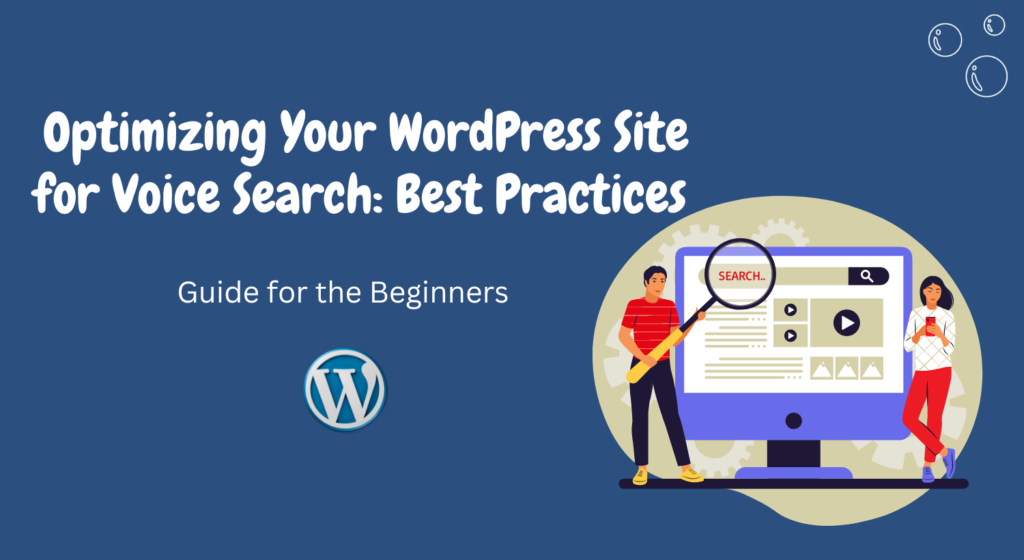In today’s digital age, voice search has emerged as a game-changing technology that is revolutionizing the way people interact with the internet.
With the rise of virtual assistants like Siri, Google Assistant, and Amazon Alexa, optimizing your WordPress site for voice search has become crucial to ensure that your content remains accessible and relevant to a rapidly growing user base.
In this article, we will delve into the best practices for optimizing your WordPress site for voice search, enhancing user experience, and staying ahead in the SEO game.
Table of Contents
- Understanding the Importance of Voice Search
- Choosing the Right Keywords for Voice Search Optimization
- Structuring Your Content for Voice Search
- Optimizing Featured Snippets for Voice Queries
- Improving Website Loading Speed
- Mobile Responsiveness Matters
- Utilizing Schema Markup for Rich Results
- Local SEO for Voice Searches
- Creating Conversational and Natural Content
- Utilizing FAQs for Voice Search Optimization
- Focusing on Long-Tail Keywords
- Continuous Monitoring and Optimization
- User Experience and Engagement
- Voice Search and E-Commerce Integration
- Measuring and Analyzing Voice Search Performance
Understanding the Importance of Voice Search
Voice search is changing the way people search for information online.
With more users utilizing voice-enabled devices, it’s essential to adapt your WordPress site to cater to this new trend.
Voice searches are often longer and more conversational in nature, requiring a shift in your keyword strategy.
Choosing the Right Keywords for Voice Search Optimization
Long-tail keywords are key when it comes to voice search.
Think about how people naturally ask questions and incorporate those phrases into your content.
Tools like Google’s Keyword Planner can help you identify relevant keywords.
Structuring Your Content for Voice Search
Organize your content with clear headings and subheadings.
Use schema markup to help search engines understand your content’s structure. This not only aids voice search but also enhances overall SEO.
Optimizing Featured Snippets for Voice Queries
Featured snippets are concise answers to user queries.
Structure your content to provide direct and concise answers. This increases the chances of your content being featured in voice search results.
Improving Website Loading Speed
Website speed is crucial for both user experience and SEO.
Compress images, leverage browser caching, and choose a reliable hosting provider to ensure your WordPress site loads quickly.
Mobile Responsiveness Matters
Most voice searches come from mobile devices.
Ensure your WordPress site is mobile-responsive to provide a seamless experience to users regardless of the device they’re using.
Utilizing Schema Markup for Rich Results
Schema markup helps search engines understand the context of your content.
Implementing schema markup can lead to rich results, making your content stand out in search engine listings.
Local SEO for Voice Searches
Voice searches often have local intent.
Optimize your site for local SEO by claiming your Google My Business listing and including location-specific keywords in your content.
Creating Conversational and Natural Content
Voice search queries are conversational in nature.
Create content that sounds natural when spoken aloud. Focus on answering specific questions concisely.
Utilizing FAQs for Voice Search Optimization
FAQs are a great way to address common queries.
Format your FAQs using structured data to increase the chances of being featured in voice search results.
Focusing on Long-Tail Keywords
Long-tail keywords are more specific and tend to match the way people speak.
Tailor your content to address these specific queries.
Continuous Monitoring and Optimization
SEO is an ongoing process.
Regularly monitor your site’s performance in voice search and make necessary optimizations to stay competitive.
User Experience and Engagement
A positive user experience is crucial.
Ensure your site is easy to navigate and offers valuable information that keeps users engaged.
Voice Search and E-Commerce Integration
For e-commerce sites, optimizing for voice search can boost sales.
Focus on providing concise product information and using schema markup for product details.
Measuring and Analyzing Voice Search Performance
Use tools like Google Analytics to track the performance of voice search traffic.
Analyze user behavior and adjust your strategy accordingly.
Conclusion
Incorporating voice search optimization into your WordPress site strategy is no longer a luxury but a necessity.
By following these best practices, you can enhance user experience, increase your site’s visibility in voice search results, and stay ahead in the ever-evolving digital landscape.
FAQs
Is voice search really that important for my WordPress site?
Voice search is becoming increasingly important as more users adopt voice-enabled devices. Optimizing for voice search can improve your site’s accessibility and SEO.
How do I find the right long-tail keywords for voice optimization?
Tools like Google’s Keyword Planner can help you identify relevant long-tail keywords based on natural language queries.
What role does schema markup play in voice search optimization?
Schema markup helps search engines understand the context of your content, making it more likely to be featured in voice search results.
Can optimizing for voice search improve my local business’s visibility?
Yes, optimizing for voice search can enhance local SEO, especially for location-specific queries.
How often should I monitor and update my voice search optimization strategy?
SEO is an ongoing process. Regularly monitor your site’s performance and make updates as needed to maintain competitiveness in voice search results.


